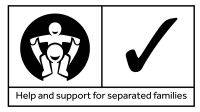{loadposition article-advertise}
One of the first things to be affected when your family separates is your housing. It’s important that you make good decisions about your housing needs. Dad.info looks at the options.
Factors that will shape your choices
There are a number of key factors that will determine your choices around housing after your divorce or separation. These will include:
- your current housing position – for example, whether you own, rent or share your housing
- your entitlement to that housing – for example, whether you are the sole or joint owner or tenant
- your family’s financial position – for example, it may not be affordable for either of you to remain in your current housing
- the arrangements you make for care and contact – it’s important that your child has somewhere suitable to live when they are with each of you
When you first separate, you will need to decide whether you want to stay in the home or move out. In the initial stages your choices are likely to be:
- staying in the home while your partner moves out
- moving out while your partner stays in the house
- both leaving the house and finding new homes
- carry on living together in the same house but not as a couple
Reaching agreement
It is very important that you make the right decisions about your future housing needs and it is always a good idea to get some specialist advice. The organisation Shelter has a wealth of experience in all housing matters. Your local Citizens Advice Bureau will also be able to provide you with help. However, if you own your current home, it is a good idea to seek advice from a solicitor.
When reaching agreement, you should consider the effect of your choices on your children. Will they be able to maintain a quality relationship with you both? Will they be required to move school? Will they still be able to see their friends and wider family?
If you are married or in a registered civil partnership
If you are getting divorced or dissolving your registered civil partnership, you can also ask the court to make orders to do with your home. The kind of orders the court can make include:
- regular maintenance payments
- lump sum payments
- property adjustment orders (if you and / or your partner are home owners)
- tenancy transfer (if you and / or your partner are tenants)
- pension adjustments
If you’re not married or in a registered civil partnership
If you are not married or in a civil partnership, the courts have fewer powers to make orders about what happens to your home. You may have to rely on what has been agreed in the past and contributions you have both made.
New housing options
If it is decided that you will leave the family home, it is important that you find new accommodation as soon as possible. Make sure you get somewhere that has a comfortable place for your children to stay. Again, your choices may be constrained by your financial position.
The main choices that you have are buying a new home, renting privately or lodging. If your child is going to live with you for most of the time, you may qualify to rent from your local authority or housing association.








